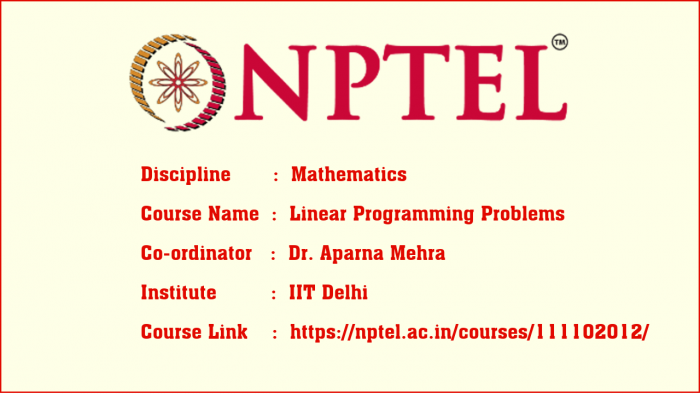
Media Storage Type : DVD-ROM
NPTEL Course Name : Linear Programming Problems
NPTEL Subject Matter Expert : Dr. Aparna Mehra
NPTEL Co-ordinating Institute : IIT Delhi
NPTEL Lecture Count : 36
Lecture Titles:
Lecture 1 - Linear programming modeling, Optimal solutions and grap
Lecture 2 - Notion of convex set, convex function
Lecture 3 - Preliminary definitions (like convex combination
Lecture 4 - Optimal hyper-plane and existence of optimal solut
Lecture 5 - Basic feasible solutions: algebraic interpretation
Lecture 6 - Relationship between extreme points and correspond
Lecture 7 - Adjacent extreme points and corresponding BFS alo
Lecture 8 - Fundamental theorem of LPP and its illustration th
Lecture 9 - LPP in canonical form to get the initial BFS and meth
Lecture 10 - Case of unbounded LPP, Simplex algorithm and illustrati
Lecture 11 - Artificial variables and its interpretation in co
Lecture 12 - Two phase method and illustration
Lecture 13 - Degeneracy and its consequences including cases of cycl
Lecture 14 - Introduction to duality and formulation of dual LPP for d
Lecture 15 - Duality theorems and their interpretations
Lecture 16 - Complementary slackness theorem, Farkas Lemma
Lecture 17 - Economic interpretation and applications of duality
Lecture 18 - Dual simplex method and its illustration
Lecture 19 - Post optimality analysis: the cases of change in re
Lecture 20 - Sensitivity analysis for addition and deletion of
Lecture 21 - Lecture 3
Lecture 22 - Karmarkar's interior point method
Lecture 23 - How to model the given LPP in Karmarkar's framewo
Lecture 24 - Complexity issue of Karmarkar's method
Lecture 25 - Integer programming: modeling and a look at its feasi
Lecture 26 - Gomory cut algorithm and derivation of cut equatio
Lecture 27 - Examples
Lecture 28 - Branch and Bound algorithm
Lecture 29 - Special LPPs: Transportation programming problem, m
Lecture 30 - Initial BFS and optimal solution of balanced TP pr
Lecture 31 - Other forms of TP and requisite modifications
Lecture 32 - Assignment problems and permutation matrix
Lecture 33 - Hungarian Method
Lecture 34 - Duality in Assignment Problems
Lecture 35 - Network Problems and LPP Formulation
Lecture 36 - Network Simplex Method:

